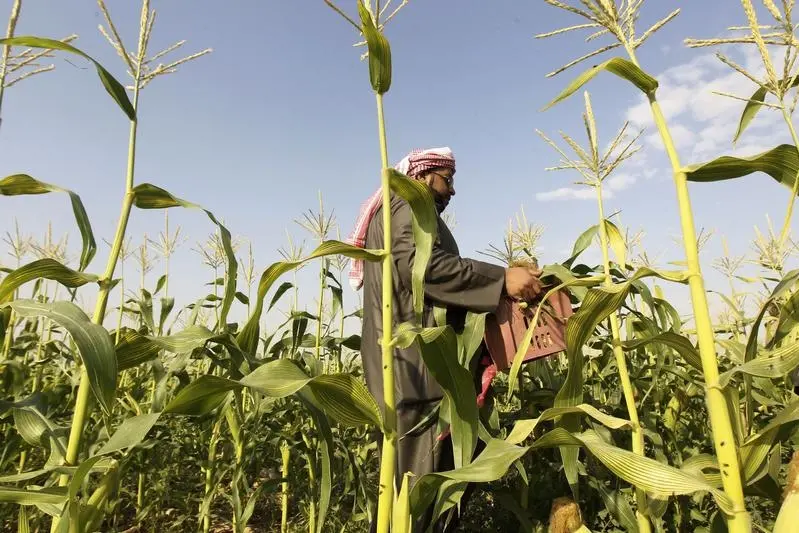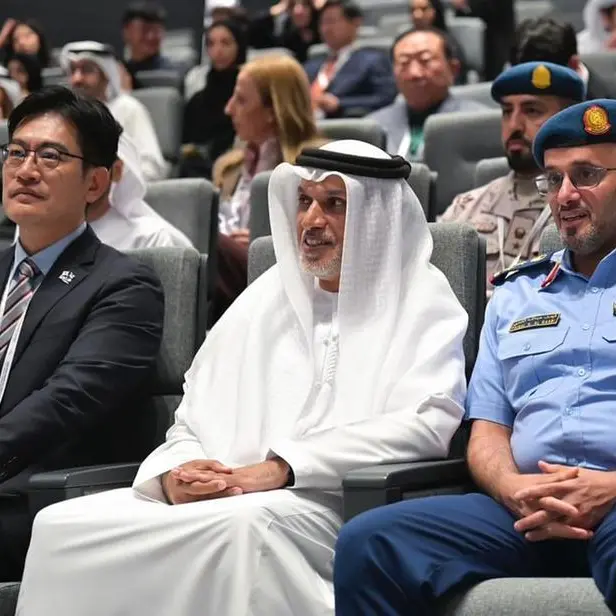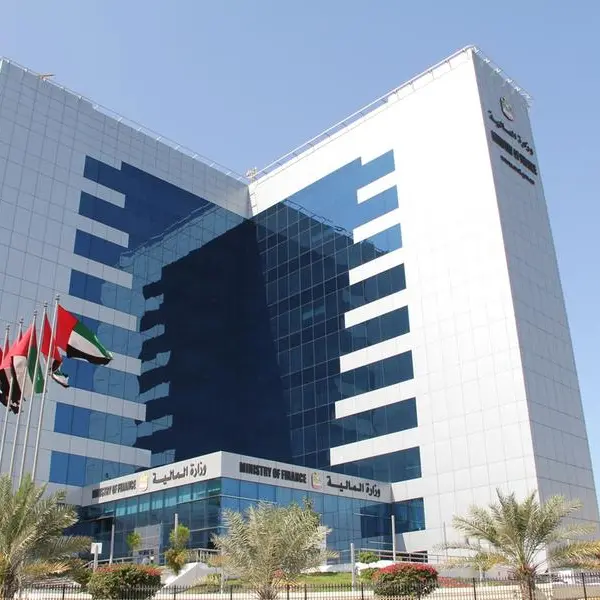PHOTO
The United Arab Emirates (UAE) and Saudi Arabia are looking to ramp up their partnerships and joint ventures in order to bolster food security levels for their growing populations, a senior UAE official said.
“Today neither UAE nor Saudi are arable lands. So the food security concerns created a will for both countries to get into joint investments that could see a third party or country, not necessarily in UAE or Saudi,” Abdulla Al Saleh, Undersecretary for Foreign Trade and Industry at the UAE Ministry of Economy told Zawya in an Arabic interview at a business forum in Abu Dhabi this month.
“This is one of the ways to reduce the investment and production costs of food commodities. When there is a larger capital along with a bigger target market, the investment return is definitely better,” he added.
Earlier this month, a unit of Saudi Arabia’s Public Investment Fund signed a $1.3 billion joint venture agreement with an Emirati agricultural firm Al Dahra to invest in grains and livestock in the Black Sea region, in a key announcement at the UAE-Saudi Business Forum.
The CEO of the Saudi unit, Saudi Agriculture and Livestock Investment Company (SALIC), told reporters on the sidelines of the event that overseas agricultural investments are needed to make up for the grains not being produced locally.
In 2016, Saudi Arabia ended its domestic wheat production to save its scarce water reserves, and it started to rely solely on wheat imports.
The Saudi roadmap to 2030 also noted that the use of water in agriculture will be prioritised for areas with renewable water sources.
“We will continue to build safe and sufficient strategic food reserves, to better guard against emergencies. Aquaculture will be promoted, as will strategic partnerships with countries blessed with natural resources such as fertile soil and water reserves.” the Vision 2030 document said.
Gulf Arab states are among the most exposed to risks to food security by maritime choke points, according to a report published by Chatham House in June this year.
The Strait of Hormuz bordered by Oman and Iran is a major maritime trade route for both Saudi and UAE, and it is vulnerable to tensions with Tehran.
Unlike the UAE, Saudi is not entirely dependent on the Strait of Hormuz for its imports, since it has access to an alternative maritime route Bab Al Mandab, which connects the Gulf of Aden with the Red Sea. The strait, however, is vulnerable to piracy and Yemen’s Houthis attacks.
UAE food security strategy
Sheikh Mohammed bin Rashid Al Maktoum, Vice President and Prime Minister of the UAE and ruler of Dubai, highlighted food security as “a national future issue” in last week’s cabinet reshuffle that saw the appointment of Maryam Al Mehairi as the Minister of State for Food Security, in a key sign of prioritising food security among the country’s policies.
Around 88 percent of the UAE’s wheat imports transit via the Strait of Hormuz, Chatham House report said, adding that this dependence started to decline after a grain silo hub in Fujairah commenced operations.
The UAE has started to build some facilities to store basic commodities and some grains, Al Saleh told Zawya, adding that this is a strategic aspect of the state’s food security.
“We have also established a food security system that can monitor the volume of the basic food commodities inside the country so that they suffice for three months,” he added.
“As soon as the volume of any commodity goes below the country’s need for three months, the system alerts on what commodity is falling short, and then we import the proper amount needed to fill the gap,” he said.
Al Saleh noted that a third initiative is to encourage companies in the private sector to invest in food security in countries with vast agricultural lands, rich water resources, and favourable policies and legislations.
“We now have agricultural investments in Sudan, Ethiopia, Egypt, Morocco, and Algeria. We have food security investments in India, the United States, Australia. We are also looking at countries in central Asia and Eastern Europe,” he said.
Growing trade ties
There are no customs barriers between UAE and Saudi or customs fees, Al Saleh said. “We have become an integrated market and goods move freely between both countries,” he said.
Saudi is the UAE's fourth largest trade partner, representing 4.6 percent of its total trade, he noted, and the UAE is the 6th largest trade partner for Saudi, making up 6.1 percent of the total trade of Saudi with the rest of the world.
At the Arab and Gulf Cooperation Council level, Saudi is the top trading partner for the UAE in exports, imports, as well as re-exports, and the same holds for UAE when it comes to Saudi, he added.
“As trade and investment activities between two countries increase, additional challenges arise in effect. We aim to address these obstacles, and such forums help identify them as they come along,” he said.
On the upcoming VAT introduction at the beginning of next year, Al Saleh sees no impact of the tax on the trade side.
“It will be a positive factor in strengthening the economies of both countries, and the return of the tax will be invested in development projects, infrastructure projects, and social development projects,”
“Today we cannot speak off growing an economy without the presence of a financial cushion for the government and this is part of strengthening the state’s budget and I expect the tax will have a positive return even for the private sector.”
© ZAWYA 2017
“Today neither UAE nor Saudi are arable lands. So the food security concerns created a will for both countries to get into joint investments that could see a third party or country, not necessarily in UAE or Saudi,” Abdulla Al Saleh, Undersecretary for Foreign Trade and Industry at the UAE Ministry of Economy told Zawya in an Arabic interview at a business forum in Abu Dhabi this month.
“This is one of the ways to reduce the investment and production costs of food commodities. When there is a larger capital along with a bigger target market, the investment return is definitely better,” he added.
Earlier this month, a unit of Saudi Arabia’s Public Investment Fund signed a $1.3 billion joint venture agreement with an Emirati agricultural firm Al Dahra to invest in grains and livestock in the Black Sea region, in a key announcement at the UAE-Saudi Business Forum.
The CEO of the Saudi unit, Saudi Agriculture and Livestock Investment Company (SALIC), told reporters on the sidelines of the event that overseas agricultural investments are needed to make up for the grains not being produced locally.
In 2016, Saudi Arabia ended its domestic wheat production to save its scarce water reserves, and it started to rely solely on wheat imports.
The Saudi roadmap to 2030 also noted that the use of water in agriculture will be prioritised for areas with renewable water sources.
“We will continue to build safe and sufficient strategic food reserves, to better guard against emergencies. Aquaculture will be promoted, as will strategic partnerships with countries blessed with natural resources such as fertile soil and water reserves.” the Vision 2030 document said.
Gulf Arab states are among the most exposed to risks to food security by maritime choke points, according to a report published by Chatham House in June this year.
The Strait of Hormuz bordered by Oman and Iran is a major maritime trade route for both Saudi and UAE, and it is vulnerable to tensions with Tehran.
Unlike the UAE, Saudi is not entirely dependent on the Strait of Hormuz for its imports, since it has access to an alternative maritime route Bab Al Mandab, which connects the Gulf of Aden with the Red Sea. The strait, however, is vulnerable to piracy and Yemen’s Houthis attacks.
UAE food security strategy
Sheikh Mohammed bin Rashid Al Maktoum, Vice President and Prime Minister of the UAE and ruler of Dubai, highlighted food security as “a national future issue” in last week’s cabinet reshuffle that saw the appointment of Maryam Al Mehairi as the Minister of State for Food Security, in a key sign of prioritising food security among the country’s policies.
Around 88 percent of the UAE’s wheat imports transit via the Strait of Hormuz, Chatham House report said, adding that this dependence started to decline after a grain silo hub in Fujairah commenced operations.
The UAE has started to build some facilities to store basic commodities and some grains, Al Saleh told Zawya, adding that this is a strategic aspect of the state’s food security.
“We have also established a food security system that can monitor the volume of the basic food commodities inside the country so that they suffice for three months,” he added.
“As soon as the volume of any commodity goes below the country’s need for three months, the system alerts on what commodity is falling short, and then we import the proper amount needed to fill the gap,” he said.
Al Saleh noted that a third initiative is to encourage companies in the private sector to invest in food security in countries with vast agricultural lands, rich water resources, and favourable policies and legislations.
“We now have agricultural investments in Sudan, Ethiopia, Egypt, Morocco, and Algeria. We have food security investments in India, the United States, Australia. We are also looking at countries in central Asia and Eastern Europe,” he said.
Growing trade ties
There are no customs barriers between UAE and Saudi or customs fees, Al Saleh said. “We have become an integrated market and goods move freely between both countries,” he said.
Saudi is the UAE's fourth largest trade partner, representing 4.6 percent of its total trade, he noted, and the UAE is the 6th largest trade partner for Saudi, making up 6.1 percent of the total trade of Saudi with the rest of the world.
At the Arab and Gulf Cooperation Council level, Saudi is the top trading partner for the UAE in exports, imports, as well as re-exports, and the same holds for UAE when it comes to Saudi, he added.
“As trade and investment activities between two countries increase, additional challenges arise in effect. We aim to address these obstacles, and such forums help identify them as they come along,” he said.
On the upcoming VAT introduction at the beginning of next year, Al Saleh sees no impact of the tax on the trade side.
“It will be a positive factor in strengthening the economies of both countries, and the return of the tax will be invested in development projects, infrastructure projects, and social development projects,”
“Today we cannot speak off growing an economy without the presence of a financial cushion for the government and this is part of strengthening the state’s budget and I expect the tax will have a positive return even for the private sector.”
© ZAWYA 2017





















